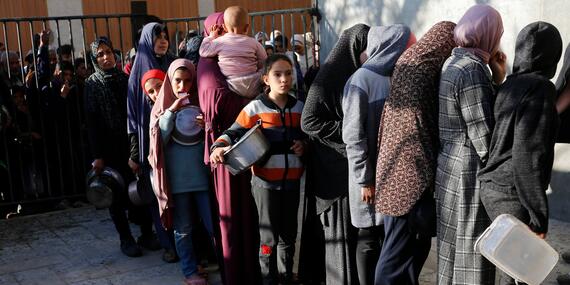Today's top news: Occupied Palestinian Territory, Haiti

Occupied Palestinian Territory
Access constraints continue to impede the timely delivery of life-saving aid, particularly to hundreds of thousands of people in northern Gaza.
During the first two weeks of March, less than half of planned humanitarian aid missions to northern Gaza were facilitated by the Israeli authorities – that’s 11 out of 24. The rest were either denied or postponed.
A reminder that dispatching aid to the north of Gaza requires day-to-day approvals from Israeli authorities. Truck convoys are frequently turned back, even after long waits at the Wadi Gaza checkpoint. They also run the risk of aid being taken by desperate people, either at the checkpoint or along the difficult route north when they do get through. The only way to prevent this is to ensure that enough aid can be delivered on a reliable basis.
We need the Israeli military to guarantee safe, sustained and unhindered access across Gaza – and to open up all possible entry points into Gaza. The only way to deliver aid on a large scale – and at the scale required to avert imminent famine – is by road.
The World Food Programme (WFP) estimates that simply addressing basic food needs will require at least 300 trucks to enter Gaza every day and distribute food, especially in the north.
With malnutrition rates skyrocketing in northern Gaza, the World Health Organization (WHO) is supporting the establishment of a nutrition stabilization centre at the Kamal Adwan hospital. In Rafah, WHO is already supporting a centre to treat children with severe acute malnutrition with medical complications. It is also helping to set up a second centre in Rafah at the International Medical Corps field hospital.
However, WHO says more nutrition and stabilization centres need to be added in all key hospitals in Gaza – and communities themselves will need support to scale up the management of malnutrition locally. To do this, we must flood Gaza with food and other life-saving aid.
Haiti
The situation in the capital, Port-au-Prince remains tense and volatile.
Schools, hospitals, government buildings continue to be attacked, with many having curtailed their operations in Port-au-Prince. On 17 March, the public electricity company reported that several electricity substations in the Port-au-Prince metropolitan area were destroyed, leaving several areas without power.
Despite the tense situation, the UN and our humanitarian partners are continuing to deliver aid. UNICEF and its partners have delivered more than 242,000 gallons of water since early March, while WFP and its partners have provided more than 146,000 hot meals. Psychosocial support is also being provided to those traumatized by the recent violence.
Meanwhile, the health sector continues to struggle due to the lack of medical supplies, healthcare workers and blood. Our humanitarian colleagues tell us that the Bernard Mevs hospital in Port-au-Prince has gradually resumed its activities, thanks to support from the WHO and the Pan American Health Organization in providing medicine and medical equipment. A stock of anesthetic drugs has been provided to Hospital Universite de Paix and Eliazar Germain Hospital in Petion-ville in Port-au-Prince.
After the first delivery of supplies to the National Blood Transfusion Centre, WHO continues to provide additional supplies to ensure the continuation of blood safety activities.
The $674 million Humanitarian Needs Response Plan for Haiti is currently 6.5 per cent funded, with $43 million received. This is nowhere near enough to respond to the scale of needs on the ground – we urgently need more support.
